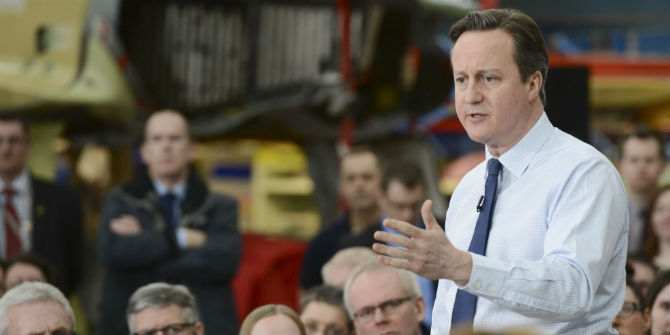 In light of Rory Stewart’s pledge to ‘launch’ a universal and compulsory National Citizen Service if elected Conservative leader and thus Prime Minister, Sarah Mills explains how the extant programme works, and why making it compulsory may be a bad idea.
In light of Rory Stewart’s pledge to ‘launch’ a universal and compulsory National Citizen Service if elected Conservative leader and thus Prime Minister, Sarah Mills explains how the extant programme works, and why making it compulsory may be a bad idea.
The current campaign for the new Conservative Party leadership and next Prime Minister has been dominated by Brexit, as well as focusing on the respective candidates and their backgrounds (and in some cases admissions of taking illegal substances). There has therefore been little space or attention on their domestic policies, especially those that relate to young people. One recent announcement was from PM hopeful Rory Stewart, MP for Penrith and The Border, that if elected he would ‘launch’ a universal National Citizen Service for 16-year-olds.
Stewart’s video announcement created a lively social media debate on National Service and British youth. However, his video bizarrely failed to mention that National Citizen Service has existed for eight years. Officially launched in 2011 by David Cameron in the context of a ‘Big Society’ vision, National Citizen Service (or NCS) is a short-term voluntary youth programme for 15- to 17-year-olds designed to improve ‘social mobility, social cohesion and social engagement’. It has now reached over half a million teenagers in England and Northern Ireland through its largely summer holiday-based programme of residential experiences and a local social action project such as fundraising, campaigning or renovation projects.
The scheme has its champions and its critics. Theresa May continued its expansion as part of her vision for a ‘Shared Society’ and NCS recently received a Royal Charter. However, its funding and investment during austere times for youth services continues to come under the spotlight. Rory Stewart’s new vision for NCS talked about creating a universal service, and although his video failed to acknowledge the existing organisation, it does mark a shift change by suggesting a compulsory youth programme for teenagers in the UK.
Following recent research on NCS, my evidence to the House of Lords Select Committee on Citizenship and Civic Engagement advised that NCS should not become compulsory. Indeed, findings summarised in the final project report outline that although the NCS programme has a range of benefits for young people, there were still a number of challenges for participants from certain backgrounds. These issues could be compounded with this potential move, for example the participation of young carers. Furthermore, a compulsory scheme would dramatically change the rationale and ‘place’ of NCS in society as well as create further obstacles for NCS Trust to integrate with the existing youth sector landscape.
Overall, NCS graduates surveyed and interviewed in this project were overwhelmingly positive about their experience, echoing early evaluations of the programme. However, my research identified contrasts between the expectations of young people and their experiences of NCS. These were largely due to regional disparities in the NCS experience, with another ‘postcode lottery’ for young people. Geography matters in relation to the exact programme young people receive, and this was most acute for participants in relation to the amount of content on political or democratic engagement. A number of these issues are being addressed through NCS Trust’s recent launch of ‘NCS 2.0’ to help ‘all young people to benefit from flagship experiences no matter where they do NCS’.
The research also uncovered that citizenship within NCS infrastructure, its curriculum and ‘on-the-ground’ is often equated with volunteering. 86% of survey respondents felt they learnt what it means to be a citizen on NCS. However, within the qualitative research, understandings of what citizenship meant were almost exclusively about the responsibilities of young citizens to volunteer and it was used as a synonym for ‘social action’ or ‘community’. Overall, citizenship within NCS is ambiguous and, at times, weakly linked to forms of political participation and the wider relationship between rights and responsibilities, a finding echoed in the House of Lords Select Committee’s final report.
Finally, the research found that the NCS model locates the real arena for active citizenship in young people’s own local towns, cities and villages – as part of a wider national collective. NCS graduates were aware that they are part of a bigger, national movement, beyond their local team. However, other ‘scales’ of youth citizenship – such as European and global citizenship formations – have been relegated. There was little awareness from participants about how their activities at the local scale were connected to global issues, politics or challenges. NCS is – like many institutions in civil society in recent years – struggling to grapple with ideas about national identity, belonging, and citizenship. In light of the EU referendum outcome and subsequent political debates, there is a pressing need for NCS to reconsider its scales of youth citizenship.
Stewart’s recent call for a universal NCS was largely interpreted on social media as a return to National Service – a military form of conscription. He spoke of his own military background in the video but did stress that his vision was for a civilian version of a type of ‘bonding’ experience for 16-year-olds. Nevertheless, social media was flooded with views from young people about potentially being forced to volunteer, as well as adults concerned about its military overtones.
Furthermore, Stewart’s announcement sparked confusion with his reference to ‘bringing people from Scotland and England together’. NCS began in England and was later adopted in Northern Ireland, but the scheme does not exist in Scotland or Wales. Indeed, the geographies of NCS are shaped by the geographies of devolution. His comment was later mocked by parts of the Scottish press, as well as sparking observations about Stewart’s awareness of devolution and the UK policymaking process.
Rory Stewart’s campaign has largely relied on social media discussion and debate. However, beneath his videos and the twitter memes are some key policy choices for whoever will become the new Prime Minister. Whilst clearly not as important as Brexit and other areas of social policy, will the new Prime Minister stick with NCS, as the flagship voluntary youth programme of the Conservative Party? Or, will they seek to break away from Cameron and May’s legacy through a re-imagined programme or vision for youth services? Either way, the domestic policies of these leadership candidates should not be forgotten in the coming days and weeks.
____________
Note: the above draws on research supported by the Economic and Social Research Council (grant number ES/L009315/1).
 Sarah Mills (@mills_sarah) is Reader in Human Geography at Loughborough University. Her research focuses on the geographies of youth citizenship, informal education and volunteering in both contemporary and historical contexts.
Sarah Mills (@mills_sarah) is Reader in Human Geography at Loughborough University. Her research focuses on the geographies of youth citizenship, informal education and volunteering in both contemporary and historical contexts.
All articles posted on this blog give the views of the author(s), and not the position of LSE British Politics and Policy, nor of the London School of Economics and Political Science.








Outdoor physical education and team-building may be fine for lots of 15 to 17 year olds, but for me and many on the autistic spectrum it would have been very unpleasant indeed as well as a complete waste of time. I think I would really have preferred to be locked in a prison cell for six weeks than forced into a strange environment outside my control with no escape or space of my own with a lot of strange children of my own age. Rory Stewart needs to be aware that what might have been good for children like him wouldn’t be good for everyone.